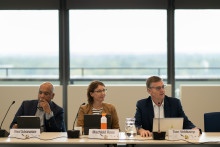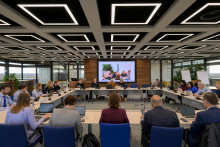Building blocks (= austerity measures)
Starting with the buzzword of buzzwords: the 'building blocks'. Or, as those 'building blocks' are now laid down: building block clusters. At the beginning of last year, the UT presented twenty measures to better absorb financial blows. Think, for example, of increasing student influx, offering education more efficiently and – yes, here it comes – 'Developing a more agile way of working'. In other words: we need to become a bit more of a lean and mean academic machine…
To make things more confusing, these building blocks were called 'major cutbacks' (‘grote ombuigingen in Dutch) not long before. To make it even more confusing, those twenty building blocks were merged into five 'building block clusters' in the summer of last year...
The only thing you really need to know: with these austerity measures – because that's what they effectively are – the UT wants to make things (education, research and support) more efficient and stronger. But that doesn't happen overnight. They are intended for the 'medium term', in other words: it takes a lot of working groups, meetings and documents before you see action and results.
Acute measures (= this is happening now)
Because those building blocks are something different from the 'acute measures' everyone is currently dealing with. We are talking about the vacancy freeze, the stop on external hiring (oh, poor consultants), the stop on student jobs, working lunches and international travel... Now you shouldn't take the term 'stop' too literally: there are plenty of exceptions for vacancies, travel and student jobs, just to name a few. And the UT has already spent about 3.5 million euros on external hiring this year – according to the latest marap. So no, those external consultants aren’t really that poor.
The marap (= the management report)
Another beautiful term, the marap. This stands for management report – and is published four times a year. Such a management report provides a lot of insight into the latest financial state of affairs. This way you can see fairly quickly whether the UT expects millions in the plus – or minus – and what the causes are.
The budget (= the annual housekeeping book)
Those pluses and minuses come with a certain context. After all, how do you know whether a deficit of 3 or 30 million is a lot or a little? Behold: the budget. Each year, the university determines how much money it expects to receive and spend. Good to know – for your perspective – is how much money this is about. The UT has about 500 million euros in income per year and almost as much expenses. So a deficit of 3.8 million euros – like last year, ultimately – is not very much.
The ‘kaderbrief’ (= looking ahead to the coming years)
What ends up in a budget has its origin in the kaderbrief – or ‘framework letter’, literally translated. It was previously called 'Spring Memorandum'. Such a document is a matter of looking ahead: what kind of developments does the university face? And how many incoming students, research funding and expenditure do we expect in the coming years? And how are we going to divide all that among ourselves? Actually, such a kaderbrief is not very different from a multi-year budget, but slightly different. Compare it to a colouring page: the ‘kaderbrief’, that’s the lines, the budget is where those lines get coloured in.
'Financial hygiene' (= the administration in order)
A fashionable term that emerged at the end of last year: 'financial hygiene'. That term was explicitly reflected in the then leaked report that the UT had drawn up by financial consultancy firm Improfin. This hygiene refers to how UT employees deal with the registration of project and leave hours and other administrative work. UT employees are said to 'not always stick to agreements' and 'lack respect for the financial rules of the game'. In short: administration is mainly a particularly inconvenient side issue for UT employees. To stay true to the hygiene metaphor: UT employees are apparently not averse to playing outside, but there is not always a thorough scrubbing in the shower.
Money streams (= where does the money come from?)
In our coverage of the UT's financial headaches, the term 'second and third money streams' comes up with some regularity. To put it briefly: the UT has three different types of money streams: the first money stream is everything from the ministry, the second money stream is everything from Dutch research funders such as NWO. The third stream of funding consists of other research assignments, such as from the business community and from European subsidies. About 70 percent of UT's income consists of the first flow of funds, 30 percent of the second and third flow of funds.
Reorganisations or organisational changes (= fewer people or working differently)
The first reorganisations in a long time are a fact. The impact at the Faculty of Science & Technology is well known. ITC also announced a reorganisation this spring. The ATLAS programme is also closing and has to reorganise as a result. They all have – or will have – consequences for employees who (may) lose their jobs. On the other hand, the Marketing & Communication department recently announced an organisational change. That remains without consequences for people's jobs.
The difference? Quite simple: a reorganisation has 'far-reaching legal consequences' for employees – in other words: dismissals. This does not apply to an organisational change, where people basically 'just' have to work differently. To this end, the UT has drawn up rules for this, the Organisational Changes Ruling.
'Reinventing our UT' (= how are we going to do it differently?)
Again some management jargon: last autumn there was suddenly a 'position paper', called Reinventing our UT. The strategic board (Executive Board, deans and scientific directors) wrote this paper. Think of that as a kind of overview of the university's strengths and challenges and how to deal with them. But that all remained either a bit abstract, or some open doors were kicked in. That overview was translated into seven 'principles', which will also sound quite logical to your ears: we are high tech, human touch and entrepreneurial, education is our core, we do excellent research and we want to make an impact. But we do have to change our structure and culture. How? That is still the question.
Strategic plan (= what kind of university do we want to be?)
Because that position paper and those seven principles ultimately form the prelude to a so-called institutional plan. The UT community will have a say in this after the summer. After all, that strategic plan must ultimately answer the question: what kind of university do we want to be? Spoiler alert, through President of the Executive Board Vinod Subramaniam: 'We are not suddenly going to do a lot of things differently. We remain an institution that provides very good education, does very good research and has an entrepreneurial attitude.'







